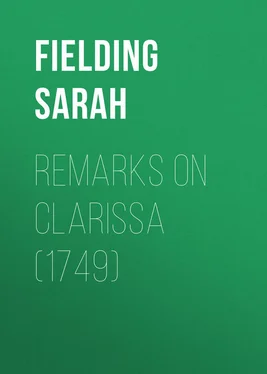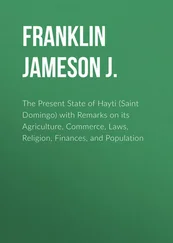Sarah Fielding - Remarks on Clarissa (1749)
Здесь есть возможность читать онлайн «Sarah Fielding - Remarks on Clarissa (1749)» — ознакомительный отрывок электронной книги совершенно бесплатно, а после прочтения отрывка купить полную версию. В некоторых случаях можно слушать аудио, скачать через торрент в формате fb2 и присутствует краткое содержание. Жанр: foreign_antique, foreign_prose, на английском языке. Описание произведения, (предисловие) а так же отзывы посетителей доступны на портале библиотеки ЛибКат.
- Название:Remarks on Clarissa (1749)
- Автор:
- Жанр:
- Год:неизвестен
- ISBN:нет данных
- Рейтинг книги:3 / 5. Голосов: 1
-
Избранное:Добавить в избранное
- Отзывы:
-
Ваша оценка:
- 60
- 1
- 2
- 3
- 4
- 5
Remarks on Clarissa (1749): краткое содержание, описание и аннотация
Предлагаем к чтению аннотацию, описание, краткое содержание или предисловие (зависит от того, что написал сам автор книги «Remarks on Clarissa (1749)»). Если вы не нашли необходимую информацию о книге — напишите в комментариях, мы постараемся отыскать её.
Remarks on Clarissa (1749) — читать онлайн ознакомительный отрывок
Ниже представлен текст книги, разбитый по страницам. Система сохранения места последней прочитанной страницы, позволяет с удобством читать онлайн бесплатно книгу «Remarks on Clarissa (1749)», без необходимости каждый раз заново искать на чём Вы остановились. Поставьте закладку, и сможете в любой момент перейти на страницу, на которой закончили чтение.
Интервал:
Закладка:
The next Objection was raised by Mr. Dellincourt , who found great Fault with the Liberties you have taken with the English Language, and said, you had coined new Words, and printed others as if you was writing a Spelling-book, instead of relating a Story. We were all silent for a few Moments, and then Miss Gibson said;
"Indeed, Sir, I do not pretend to be any Judge of the Accuracy of Stile, but I beg to know, if in the writing familiar Letters, many Liberties are not allowable, which in other kinds of writing might perhaps be justly condemned: And as to the printing some of the Words with Breaks between the Syllables, it certainly makes the Painting the stronger; however, I submit this entirely to the Judgment of others. But supposing this to be a failing, surely it is a trifling one, to censure a Book severely for, in which there are so many striking Beauties to be found. But to illustrate my Thoughts on this Head, I will tell you a Story that is really true.
"A Gentleman shewed a Friend of his a Picture of a favourite Horse, drawn by the celebrated Mr. Wooten . The Horse was unexceptionably beautiful, and the Picture excellently drawn. His Friend regarded it for some Time with great Attention: When the Gentleman (who was a Lover of Pictures, and who delighted to share his Pleasures with others) earnestly asked his Friend's Opinion of the Piece he was viewing; who, after much Consideration, with a significant Shrug of his Shoulders, and a contemptuous Toss of his Hand, said, I don't like the Skirts of the Saddle ."
The Application of this Story was so very plain, that the whole Company were diverted with it; and thus, Sir, I think I have sumed up all the Critisism I heard either against or in favour of your Clarissa , on the Publication of the two first Volumes.
The next Scene of Criticism (if I may so call it) on Clarissa that I was present at, was on the Publication of the two succeeding Volumes.
The same Company met, with the Addition only of one Gentleman, whom I shall call Bellario ; his known Taste and Impartiality made all those who wished Reason instead of Prejudice might judge of the Subject before them, rejoice at his Presence. The Objections now arose so fast, it was impossible to guess where they would end. Clarissa herself was a Prude – a Coquet – all the Contradictions mentioned some Time ago in a printed Paper, with the Addition of many more, were laid to her Charge. She was an undutiful Daughter – too strict in her Principles of Obedience to such Parents – too fond of a Rake and a Libertine – her Heart was as impenitrable and unsusceptible of Affection, as the hardest Marble. In short, the many contradictory Faults that she was at once accused of, is almost incredible: So many, that those who had attended enough to her Character, to have an Inclination to justify her, found it difficult to know where to begin to answer such a complicated Charge. But after a short Silence, Miss Gibson with her usual Penetration, said;
"Whenever any Person is accused of a Variety of Faults, which are plainly impossible to dwell in the same Mind, I am immediately convinced the Person so accused is innocent of them all. A Prude cannot, by an observing Eye, be taken for a Coquet, nor a Coquet for a Prude, but a good Woman may be called either, or both, according to the Dispositions of her resolved Censurers; and hence I believe we may trace the Cause, why the Characters even of those Persons who do not endeavour to wear any Disguise are so very liable to be mistaken; for Partiality or Prejudice generally sit as Judges: If the former mount the Judgment-seat, how many different Terms do we make use of to express that Goodness in another, which our own fluctuating Imaginations only have erected? If the latter, how do we vary Expressions to paint that Wickedness which we are resolve to prove inhabits the Mind we think proper to condemn?" "Nay, but (said Mr. Dellincourt ) how are we concerned either to justify or accuse Clarissa ? we cannot be either partial to, or prejudised against her." "I know not how it is, (replyed Miss Gibson ) but those who dread Censure, tho' Circumspection wait on every Step, will be censured, till there no longer remains in the World any of those Dispositions that delight in inflicting that Punishment on others they see they most fear. Now, tho' Clarissa was not so blameably fearful of Censure, but that her first Care was to preserve the Innocence of her own Mind, and do no wrong; yet it is plain, she would very gladly have avoided incurring, as well as deserving, Reproach; and that she is treated like an intimate Acquaintance by all her Readers, the Author may thank himself for. I dare say, the Authors of Cassandra , Clelia , with numberless others I could name, were never in any Danger of having their Heroines thought on, or treated like human Creatures."
Bellario , who had hitherto been silent, said, "He thought Clarissa could not justly be accused of any material Fault, but that of wanting Affection for her Lover; for that he was sure, a Woman whose Mind was incapable of Love, could not be amiable, nor have any of those gentle Qualities which chiefly adorn the female Character. And as to her whining after her Papa and Mamma, who had used her so cruelly, (added he) I think 'tis contemptible in her."
"But, Sir, (said Miss Gibson ) please only to consider, first, Clarissa is accused of want of Love, and then in a Moment she is condemned for not being able suddenly to tear from her Bosom an Affection that had been daily growing and improving from the Time of her Birth, and this built on the greatest paternal Indulgence imaginable. Affections that have taken such deep Root, are little Treasures hoarded up in the good Mind, and cannot be torn thence without causing the strongest convulsive Pangs in the Heart, where they have been long nourished: And when they are so very easily given up as you now, Sir, seem to contend for, I confess I am very apt to suspect they have only been talked of by the Persons who can part with them with so little Pain, either from Hypocrisy, or from another very obvious Cause, namely, the using Words we are accustomed to hear, without so much as thinking of their Meaning. Such Hearts I think may be much more properly compared to the Hardness of Marble, than could that of the gentle Clarissa .
"There is in her Behaviour, I own, a good deal of apparent Indifference to Lovelace ; but let her Situation and his manner of treating her be considered, and I fancy the whole will be seen in a different Light from what it may appear on the first View. She has confessed to Miss Howe , that she could prefer him to all the Men she ever saw; and that Friend of her Heart, to whom her very inmost Thoughts were laid open all along, pronounces her to be in Love with him. It is not from Hypocrisy that she does not confess the Charge, but from the Reason Miss Howe
Конец ознакомительного фрагмента.
Текст предоставлен ООО «ЛитРес».
Прочитайте эту книгу целиком, купив полную легальную версию на ЛитРес.
Безопасно оплатить книгу можно банковской картой Visa, MasterCard, Maestro, со счета мобильного телефона, с платежного терминала, в салоне МТС или Связной, через PayPal, WebMoney, Яндекс.Деньги, QIWI Кошелек, бонусными картами или другим удобным Вам способом.
Интервал:
Закладка:
Похожие книги на «Remarks on Clarissa (1749)»
Представляем Вашему вниманию похожие книги на «Remarks on Clarissa (1749)» списком для выбора. Мы отобрали схожую по названию и смыслу литературу в надежде предоставить читателям больше вариантов отыскать новые, интересные, ещё непрочитанные произведения.
Обсуждение, отзывы о книге «Remarks on Clarissa (1749)» и просто собственные мнения читателей. Оставьте ваши комментарии, напишите, что Вы думаете о произведении, его смысле или главных героях. Укажите что конкретно понравилось, а что нет, и почему Вы так считаете.












